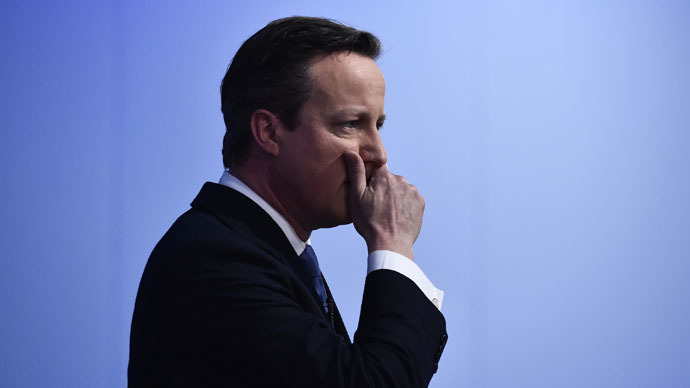Brussels scuppers Cameron’s EU referendum pledge

European Commission head Jean-Claude Juncker has ruled that no treaty negotiations on the UK’s EU membership will take place until two years after Prime Minister David Cameron’s proposed referendum date.
“No treaty change proposals are envisaged until after November 2019, the end of Mr Juncker’s mandate as president of the commission,” an official told the Times newspaper.
It is also thought that while 2019 would be the earliest time plans could be formalized, negotiations would still not begin until 2020.
The move would leave in tatters Cameron’s pledge to hold an in/out referendum on the EU in 2017 if he is re-elected next month.
The Tory manifesto, released Tuesday, argues that continued UK membership of the EU must be based on two conditions.
“We want national parliaments to be able to work together to block unwanted European legislation and we want an end to our commitment to ‘ever closer union’ as enshrined in the treaty to which every country has to sign up,” it says.
READ MORE: 'Defeated' Cameron congratulates Juncker on EC win, says it's not a 'fatal blow'
Attaining such conditions would hinge, in the Conservatives’ view, on a renegotiation of the Lisbon Treaty in order to attain what they see as more favorable terms for Britain as a member.
The impasse is unlikely to improve relations between Cameron and Juncker, which are famously fraught.
Last year Cameron campaigned to stop Juncker, a former prime minister of Luxembourg, from taking the top job at the European Commission.
“All major UK parties are now united on one point: Jean-Claude Juncker should not be President of the European Commission,” Cameron said at the time.
However, he was obliged to publicly congratulate Juncker when the latter was eventually elected to the presidency.
READ MORE: Gibraltar wants to keep EU ties if Britain votes to leave
The Tory position on EU membership received another blow on Tuesday when Gibraltar’s Chief Minister Fabian Picardo said the government of the self-governing British territory would push for a “different degree of membership” of the EU if Britain holds a referendum on whether to leave.
“In the event of there being a referendum, each of the areas that vote, each of the nations that vote, Gibraltar included, should be counted separately,” Picardo told the Financial Times.
Gibraltar's economy would face an “existential threat” if Britain left the EU without securing a way to maintain access to the EU's 500-million-strong single market, he added.
Picardo doubts “even the most rabid anti-Europeans in the UK, in their moments of supreme madness, would advocate a ‘complete out’.”












